- Home
- Sara Shepard
The Heiresses Page 3
The Heiresses Read online
Page 3
Mr. No-Knickers Waiter reappeared with several lit sparklers and a bottle of Grey Goose L’Orange. Aster joined in everyone’s squeals of excitement as she reached for a sparkler, waving it in the air as some R&B artist crooned over the speakers.
She reached for her phone, seized with the desire to invite more people out. The first person who came to mind was her cousin Poppy. It rang once, then her cousin’s sleepy voice broke through.
“Pops!” Aster called out over the noise of the club. “What are you doing right now?”
“I’m home.” Poppy yawned. “What are you doing?”
Aster held out her champagne flute for a refill. “I’m out. Will you come? Please?”
When they were growing up, Aster prided herself on not trying too hard to be like Poppy, like her sister Corinne always did. Poppy was her friend—like a cool big sister who didn’t give Aster shit about her choices. Well, most of the time. She had given Aster a pretty harsh talking-to after Aster confessed she’d seduced her European history teacher at NYU for a better grade, then dropped out of college altogether. But Poppy pried because she cared.
“Ugh, I’m beat.” Poppy sighed through the phone. “I’m in back-to-back meetings for the rest of the decade, Briony’s been up every night this week, and I’m losing my mind planning this birthday party for Skylar. I’m such a buzzkill. But why don’t you call your sister? Maybe she’d like to come.”
Aster burst out laughing. “You were there today, Poppy. She’s probably not going to speak to me ever again.”
She rolled her eyes, recalling Corinne’s gown fitting that morning. Who scheduled a fitting at 9:30 on a Saturday, anyway? She had woken up with a start, remembering the three messages her sister had left her the day before, and wriggled out from underneath Nigel’s arm. She hadn’t even taken the time to shower or explain where she was going, instead just throwing on her clothes and sprinting out of her apartment with her shoes only half on. Only in the cab did she realize she still smelled like the tequila shots from the night before.
At least the rain might help with that, Aster had thought wryly as she raced down Lhuillier’s block under the shitty umbrella she’d bought from a bodega on the corner. But when she walked into the salon, she’d seen the look on her sister’s face. Corinne wasn’t happy that Aster was there or worried at all about her soaked appearance. She just wrinkled her nose in that way she always did, as if Aster had ruined everything.
Poppy heaved a sigh. “I think she just had an idea of how she wanted things to go, honey. And you sort of threw a wrench into that.”
“Well, she’s got to learn that sometimes life throws you wrenches,” Aster shot back, crossing her arms over her chest.
“You should try to see things her way,” Poppy said quietly.
Aster scoffed. “What about her seeing things my way? Has she ever done that?” Aster already knew the answer: No. Corinne didn’t like things she couldn’t understand. And she had never understood Aster.
Poppy yawned. “I’m sorry I’m so old and lame. Do you want to grab a drink later this week?”
Aster cradled the phone, touched. Even when Poppy was up to her eyeballs in work and family duties, she always made time for Aster. Even in the aftermath of Poppy’s parents’ death in that freakish plane crash two years ago, Poppy had come to brunch with Aster for her birthday just days later. She was always so . . . solid. Unflappable. “Of course,” Aster said. “Just let me know when you’re free.”
She hung up and took another swig of champagne, then another. She was feeling warm and distinctly fuzzy at the edges; she’d drained almost the whole bottle. She hiccuped loudly, watching as her friends stood to dance. “Are you coming?” Nigel asked, extending his hand.
Aster closed her eyes for a moment, imagining what it would be like to fall into her thousand-thread-count bed—alone. To sleep for a full eight hours, get up at a normal hour, go for a jog, stand in line for coffee. Actually make one of Corinne’s bridal activities tomorrow—surely there was one scheduled—instead of whirling in horribly late, only to be kicked out. Kicked out, she thought angrily, by her own fucking sister. What Corinne didn’t know was that Aster had protected her all these years. She’d preserved Corinne’s perfect little view of their family. Oh, there’d been plenty of times when Aster had almost blurted out what she knew, but something inside her had held back, knowing it would shatter her sister even more than it had shattered Aster. And what did Aster get in thanks? Rejection.
She grabbed the Veuve and drank it straight from the bottle, hoping to silence the thoughts that flitted around her mind like sharp little birds. All at once, she wanted to black out—to drink so much she forgot herself, forgot everything except the dance floor and the sound of the music. She held out her hand to Nigel, and he pulled her to her feet.
The crowd on the dance floor parted for them, leaving them space in the middle of the room. “You forgot your drink,” Clarissa yelled over the sound of the music, pressing another glass into her hand. Aster downed it without realizing what it was, then closed her eyes and raised her slender arms over her head, letting all the grimy memories and barbed comments from today wash down the drain. The only thing that mattered right now was having fun.
My candle burns at both ends, it will not last the night, Aster thought defiantly as she swayed slowly to the beat. Aster didn’t believe in the curse, but she did know that if another Saybrook died young, she’d be the one. Her reckless, feckless lifestyle was a ticking time bomb. Deep down, she worried she wasn’t long for this world.
But maybe that was okay, Aster thought, stumbling forward into Nigel’s arms. She’d rather be the quick-burning firecracker than a slow-to-die ember. Everyone knew it was far more fun to go out with a bang than with a whimper.
3
On Sunday afternoon, Rowan Saybrook sat in the corner of a living room in the Dakota on Central Park West and watched twelve princesses meet and greet one another. Each was adorned in a taffeta ball gown, crystal slippers, and a tiara. They plucked hors d’oeuvres from a silver tray with grace and poise.
But then Jasmine stepped on Ariel’s foot. Aurora raised an eyebrow at Sofia the First, declaring that she wasn’t as real a princess because the Disney cartoon had only started a few years ago. Rowan, sensing disaster, tiptoed out of the room and into her cousin Poppy’s kitchen, reaching for a bottle of cabernet. It was Poppy’s daughter Skylar’s third birthday, and it was probably best to let the little princesses work things out for themselves.
The kitchen was large and airy, with new marble countertops and Brazilian cherry cabinets. Poppy, dressed in a gauzy batik-print silk popover and skinny pants that made her legs look a million miles long, stood at the island, arranging the tray of chopped-up locally grown vegetables she’d bought at the Union Square farmer’s market, her twenty-month-old, Briony, balanced on her hip. She noticed Rowan pouring the wine. “The kids driving you to drink, huh?”
“I’ve never really understood the whole princess thing,” Rowan said, recorking the bottle.
“Of course you don’t,” Rowan’s mother, Leona, said good-naturedly, smiling at her daughter from across the kitchen. “This one was all about climbing the highest trees in our backyard when she was Skylar’s age. And sometimes falling out of them.”
Aunt Penelope paused from making a plate of food for her husband, Mason, the CEO of Saybrook’s, and laughed. “You could climb higher than most of the boys, Rowan. I still remember when you beat your brother at the ropes course; he sulked for days.”
Corinne, who had been leaning against the counter, sidled over to Rowan and eyed the wine. “Can you pour me a glass? I need it after the week I’ve had.”
“I heard about Turkey,” Rowan said. “Congratulations.” Then she lowered her voice. “I also heard what happened with Aster.”
Corinne’s eyes narrowed to slits. “Yeah, well. I guess we shouldn’t be surprised.” She peered around the room, probably searching for her sister, who’d been h
ere a few moments ago but was now absent. “She’s probably passed out in Poppy’s bed right now,” she spat angrily.
“Don’t worry—I’ll make sure she’s on time to the wedding,” Evan said, taking a break from directing the housekeeper’s cleanup efforts. She hated messes, especially kid messes. “Believe me when I say I’ve dealt with worse.”
“Worse than the Saybrooks?” muttered Natasha from her perch near the pantry.
“Natasha!” Natasha’s mother, Aunt Candace, snapped from the corner, where she was helping Poppy with the hors d’oeuvres.
Rowan glanced at Natasha cautiously. Not so long ago, she and Natasha had been so close. Rowan was nearly ten years older than Natasha, but she’d happily played bit parts in Natasha’s one-act plays and cheered when Natasha put on karaoke concerts on the back porch at Meriweather. But after Natasha disinherited herself from the family—never explaining why—she treated Rowan and the others like irritating pedestrians taking up the whole sidewalk on Fifth Avenue.
Rowan knew her cousins were wary of Natasha too. Except Poppy, who’d begun to mend fences with Natasha a few years ago, after Poppy’s parents died. But perhaps that was because Aunt Candace and Uncle Patrick had served as Poppy’s surrogate family after the plane crash, smothering her, James, and their girls with love, help, and baked goods for months.
Luckily everyone ignored Natasha’s comment, even the perfectly groomed moms Poppy knew from Episcopal, where Skylar attended preschool. To Rowan, those poised Manhattan mothers with their matching Bugaboo strollers were a different species. They compared notes on organic cloth diaper vendors, bragged about sleep training, and rated their friends’ live-in nannies. But as judgmental as they were of one another, they seemed to judge nonmothers most of all. “Jealousy masked by superiority,” Poppy always said. “They envy your free time, so they pretend you’re selfish for not having kids to feel better about playing patty-cake all day long.”
And that was the beauty of Poppy. She had the Bugaboo stroller and made her own organic baby food, but she’d never behaved as though motherhood was a special, exclusive club.
“What’s going on, ladies?” Poppy’s husband, James, appeared in the doorway, dressed in a vintage T-shirt and well-cut jeans that, when he raised his arms, revealed just a half inch of his Brooks Brothers boxers. He swept across the room and pulled Poppy into a hug.
Poppy wriggled away and turned toward the fridge. “Did you get the hummus from Zabar’s?” she asked briskly. “I can’t find it anywhere.”
“Right here.” James reached in and produced a container.
“Perfect.” Poppy grabbed it from him and placed it on the table, next to the veggies.
“Thanks, James,” Rowan called out, when Poppy didn’t.
James gave the moms an exaggerated bow and an irresistible grin. “Just doing my job.” Then he grabbed his wife once more and kissed her cheek. Poppy squirmed away again, and James disappeared to the den. A whistle bleated from the flat-screen TV. James, Mason, and a few other fathers were back there watching the Djokovic-Federer French Open match.
A mother named Starla, her infant Baby-Björned to her torso, sighed. “Poppy, he’s such a doll.”
“How do you keep other women away?” another woman named Amelia teased.
“Oh, he wears an ankle bracelet so I can keep track of him,” Poppy said absently.
“Poppy has it all,” said Amelia, a little unkindly. “And we all kind of hate her.” She tapped a manicured nail against the window. A biathlon was taking place in Central Park, and hundreds of runners thundered past toward the finish line. “Do you know what Bethany said when we came in?” she murmured, changing the subject. “‘Mommy, can I be in the bisexual next year?’ I was like, ‘Don’t you mean biathlon?’ But she said, ‘No, I want to be in the bisexual!’”
Poppy smirked. “Skylar said ‘douche bag’ to the doorman.”
Darcy, a blond mother, shifted her weight. She had Pilates-perfect balance even in her five-inch heels. “My daughter’s favorite word is prick.” Then she looked at Rowan. “What about yours?”
“Oh, um—”
Before Rowan could answer, Poppy clutched her arm. “Rowan is the best aunt in the world,” she said in a loud voice.
“Thanks,” Natasha said sardonically.
“Tied for best aunt,” Poppy corrected herself with a smile, squeezing Rowan tighter. “And she’s Saybrook’s senior counsel. She was first in her class at Columbia Law.”
Rowan suddenly felt too tall and too visible, all elbows and angles. Poppy meant well, but boasting about what Rowan was seemed to highlight what she wasn’t: a mother.
Fumbling to change the topic, Rowan turned toward Natasha. “So . . . how’s the studio?” she asked. After Natasha decided she no longer wanted to be a Saybrook, she’d moved to Brooklyn and reinvented herself, running a yoga studio for the borough’s bourgeoisie.
“It’s great, thanks,” Natasha said, lowering her long lashes. She was darker than the other Saybrook girls, with olive skin, sleek, dark hair, and almond-shaped eyes. “How are things going with . . . Charlie, is it?”
Aunt Penelope leaned on the cane she’d used ever since her skiing accident. Rowan’s mother set down her water glass. “Are you seeing someone, Ro?”
“Oh, we’re just friends,” Rowan said quickly.
Aunt Candace and Aunt Penelope exchanged a glance, as if to say, Oh, no. What’s wrong with this one?
Rowan’s skin prickled, and sensing more questions on the way, she excused herself, darting into the hall. She hurried past the line of Warhols, Picassos, and an Annie Leibovitz portrait of Poppy’s parents, her mom in a long, breezy dress, her strapping, tanned father in jeans and a polo shirt, in front of a ramshackle red barn. They’d always been Rowan’s favorite aunt and uncle. In middle school she’d spent several summers on their farm, shearing the sheep with Poppy and exploring the cavernous attic in their refurbished farmhouse. Uncle Lawrence hadn’t gone into the family business, but he had several old photo albums of the family from back before Papa Alfred found the Corona Diamond. Rowan and Poppy used to marvel at snapshots of Edith without her now-ubiquitous fur.
When she reached the bathroom, Rowan slipped inside and slammed the door hard. A little wooden plaque hanging from the doorknob rattled. “Go Away,” it read. Rowan’s thoughts exactly.
Rowan stared at her reflection in the mirror. She had an oval face, bow-shaped lips, a long forehead, a sloping nose, and the signature Saybrook blue eyes. Her tall frame was lithe and toned from long runs and hours on the tennis court. She knew she was pretty; plenty of people said so. And she was as successful as Poppy said—senior counsel at Saybrook’s just five years out of law school, and she sat on several review boards and charities. She loved her family, and she adored her two dogs, Jackson and Bert. But she was nearly thirty-three, and still on her own.
It was, of course, the same conundrum she’d pondered for years. Thanks to her two older brothers, who now lived across the country and overseas, Rowan had no trouble with men. Growing up, she was always up for a game of hockey or freeze tag at the end of their cul-de-sac in Chappaqua, and she beat up on Michael and Palmer as much as they beat up on her. As she got older, she and some of her cute guy friends did more than just play touch football. Girls in her class talked about only having sex when they were in love, but Rowan thought that was just about as naive as believing that putting on a satin gown made you Cinderella.
Of course, in time those were the girls who got steady boyfriends, while Rowan had just acquired a string of make-out buddies. She tried to change her ways, copying what she saw in the paired-up girls she knew, but becoming a softer, needier, whinier version of herself just didn’t work. And so she settled into the role of the quintessential guy’s girl. The one who’d go to a strip club on a lark. The one who’d match you shot for shot. The girl who didn’t give a shit about getting mani-pedis with her girlfriends, who didn’t care if porn was on, who almost seemed li
ke she didn’t need a guy.
It didn’t mean Rowan didn’t want what those other girls had. But now, she felt too old to change who she was—nor should she have to. Her parents didn’t give Rowan a hard time about being single. Her mother, Leona, had been an essayist in her pre-Saybrook life, exploring open marriages and same-sex rights—much to Edith’s embarrassment. Her father, Robert, treated Rowan the same as his sons, pushing her to be ambitious and successful over everything else. And her brothers always told her not to settle. It was Poppy who eagerly shoved eligible guy after eligible guy Rowan’s way. Though they were nice and cool and Rowan had remained friends with quite a few of them, none of them exactly . . . clicked. Rowan had felt true love once before, and she wouldn’t settle until she felt it again.
There was a knock on the bathroom door, and Rowan looked up.
“Rowan?” someone whispered. “You in there?”
Rowan opened the door a crack and saw James’s curly brown hair, light eyes, and slightly crooked smile. “No fair that you get to hide out in here,” he said mock-sternly.
James’s skin smelled like peppermint soap. A fleck of glitter from one of the princess’s wands was stuck to his cheek. Rowan refrained from brushing it away.
“I just needed a minute,” she told him.
He glanced down the hall. “Princesses getting you down? The grown-up ones, I mean?”
Rowan stared at the monogrammed towels hanging on the silver bar across the room. One bore Poppy’s initials, the other, James’s. “You could say that.”
“Do you want me to smuggle you out of here, Saybrook?” James asked, his gaze shifting conspiratorially. “We can escape out the balcony. Use the gargoyles as a ladder.”
She pictured the two of them scaling the Dakota, dropping to Central Park West, and falling in with the biathletes. They’d laugh together, like in the old days.
James slipped into the bathroom. “Is there room for another?” he asked, shutting the door. “I’m princessed out too.”

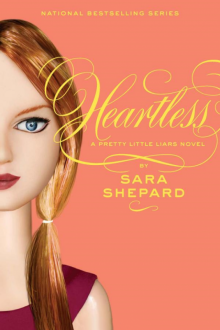 Heartless
Heartless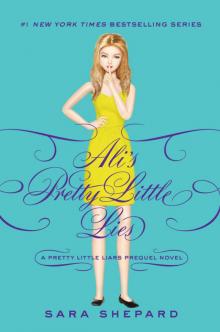 Alis Pretty Little Lies
Alis Pretty Little Lies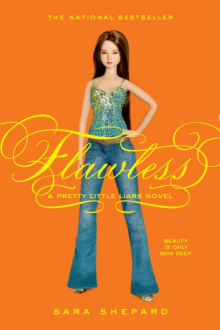 Flawless
Flawless The Elizas
The Elizas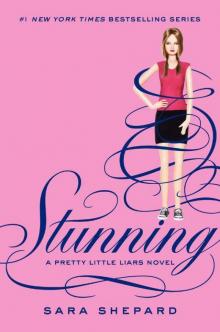 Stunning
Stunning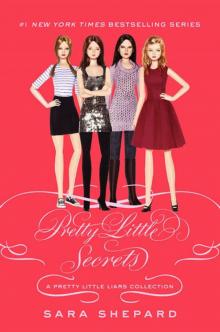 Pretty Little Secrets
Pretty Little Secrets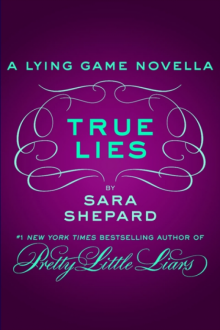 True Lies
True Lies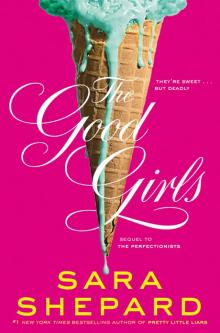 The Good Girls
The Good Girls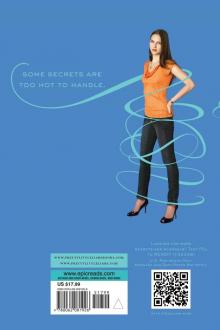 Burned
Burned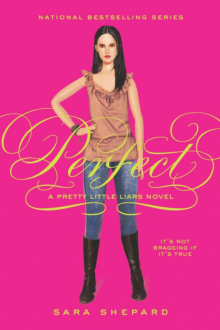 Perfect
Perfect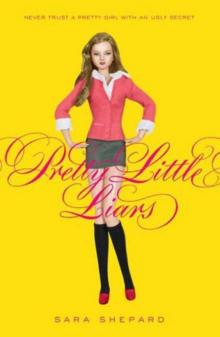 Pretty Little Liars
Pretty Little Liars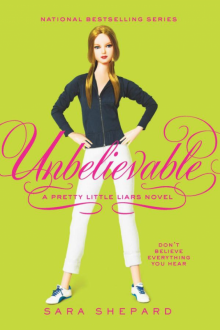 Unbelievable
Unbelievable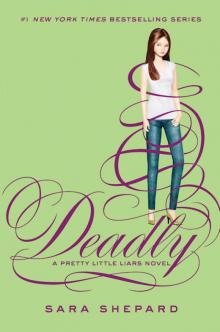 Deadly
Deadly Vicious
Vicious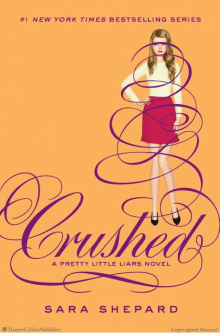 Crushed
Crushed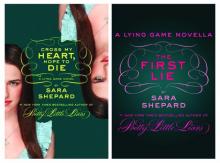 The First Lie
The First Lie Cross My Heart, Hope To Die
Cross My Heart, Hope To Die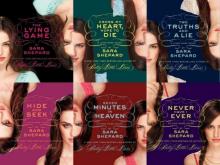 The Lying Game
The Lying Game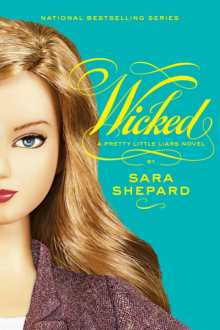 Wicked
Wicked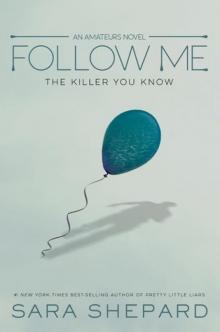 Follow Me
Follow Me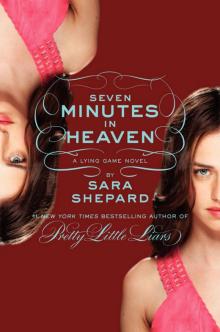 Seven Minutes in Heaven
Seven Minutes in Heaven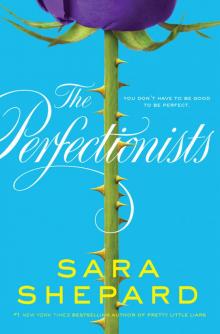 The Perfectionists
The Perfectionists Killer
Killer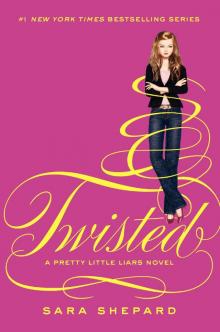 Twisted
Twisted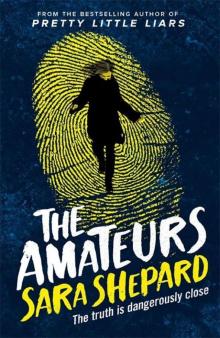 The Amateurs
The Amateurs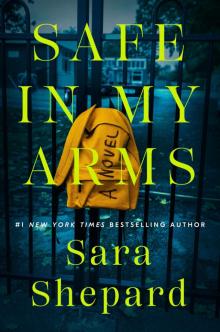 Safe in My Arms
Safe in My Arms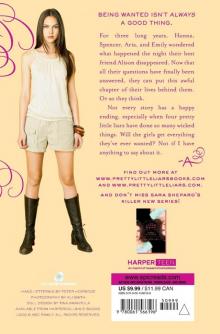 Wanted
Wanted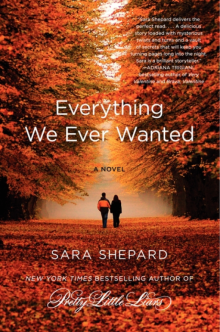 Everything We Ever Wanted
Everything We Ever Wanted Two Truths and a Lie
Two Truths and a Lie The Visibles
The Visibles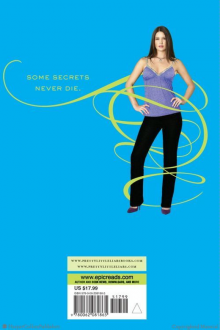 Ruthless
Ruthless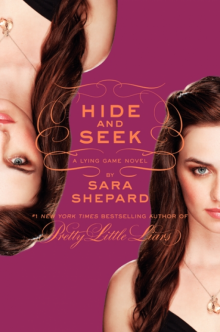 Hide and Seek
Hide and Seek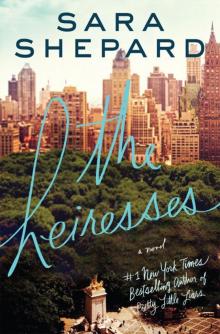 The Heiresses
The Heiresses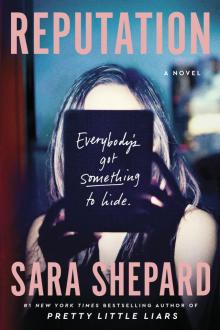 Reputation
Reputation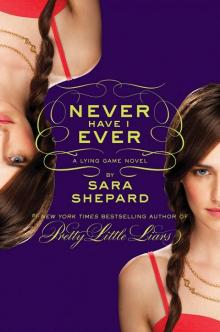 Never Have I Ever
Never Have I Ever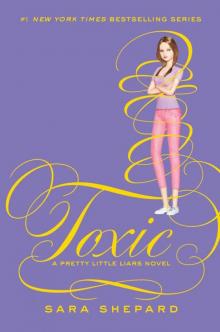 Toxic
Toxic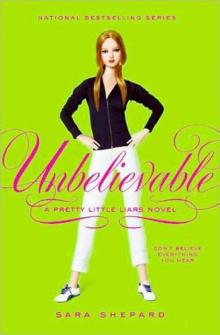 Unbelievable pll-4
Unbelievable pll-4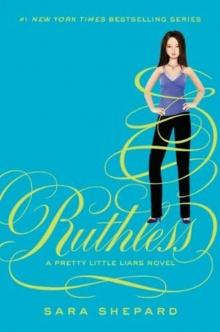 Ruthless pll-10
Ruthless pll-10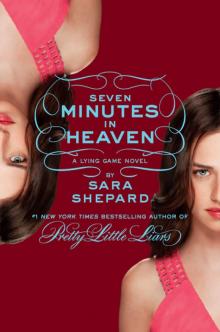 Seven Minutes in Heaven tlg-6
Seven Minutes in Heaven tlg-6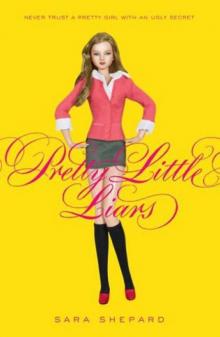 Pretty Little Liars pll-1
Pretty Little Liars pll-1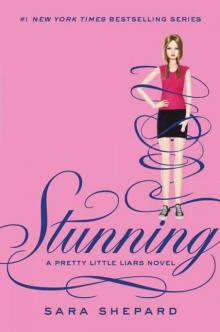 Pretty Little Liars #11: Stunning
Pretty Little Liars #11: Stunning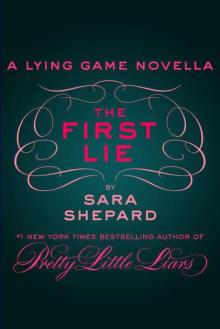 4.5 The First Lie (the lying game)
4.5 The First Lie (the lying game) The Amateurs, Book 3
The Amateurs, Book 3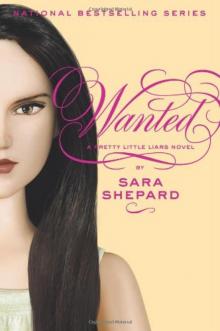 Wanted pll-8
Wanted pll-8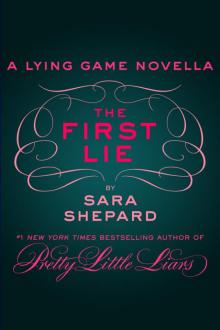 Lying Game 00: The First Lie
Lying Game 00: The First Lie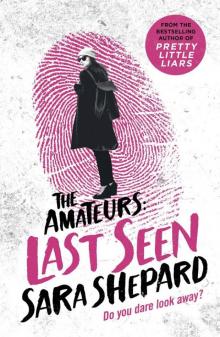 The Amateurs: Last Seen
The Amateurs: Last Seen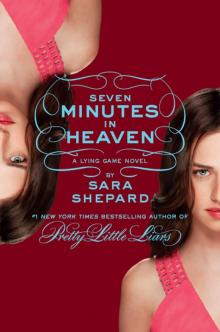 The Lying Game #6: Seven Minutes in Heaven
The Lying Game #6: Seven Minutes in Heaven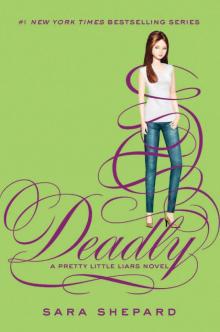 Pretty Little Liars #14
Pretty Little Liars #14 All the Things We Didn't Say
All the Things We Didn't Say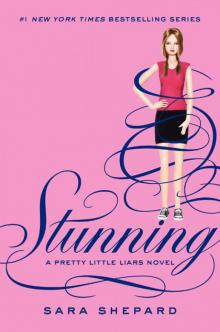 Stunning pll-11
Stunning pll-11 Heartless pll-7
Heartless pll-7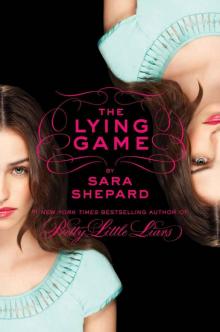 The Lying Game tlg-1
The Lying Game tlg-1 The Elizas_A Novel
The Elizas_A Novel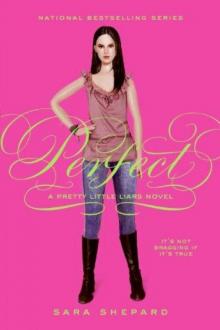 Perfect pll-3
Perfect pll-3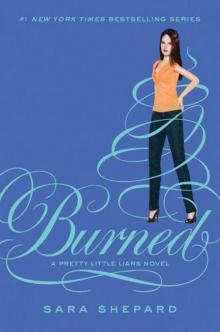 Burned pll-12
Burned pll-12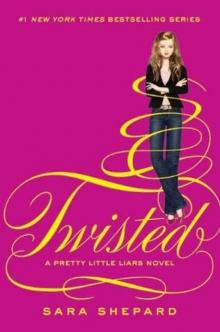 Twisted pll-9
Twisted pll-9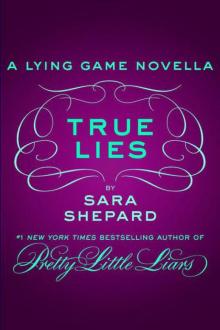 True Lies: A Lying Game Novella
True Lies: A Lying Game Novella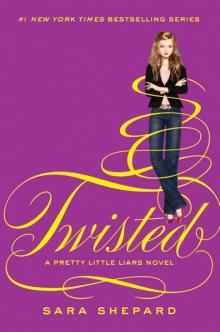 Pretty Little Liars #9: Twisted
Pretty Little Liars #9: Twisted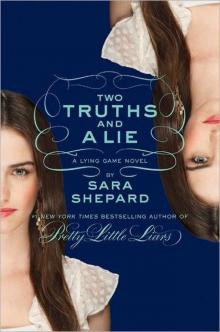 Two Truths and a Lie tlg-3
Two Truths and a Lie tlg-3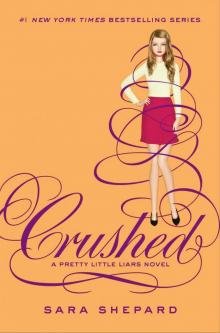 Crushed pll-13
Crushed pll-13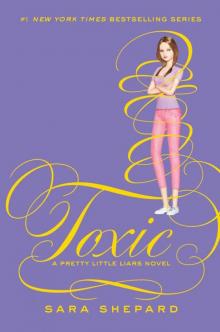 Pretty Little Liars #15: Toxic
Pretty Little Liars #15: Toxic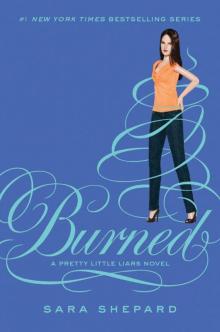 Pretty Little Liars #12: Burned
Pretty Little Liars #12: Burned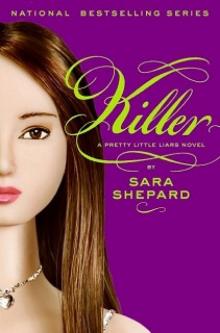 Killer pll-6
Killer pll-6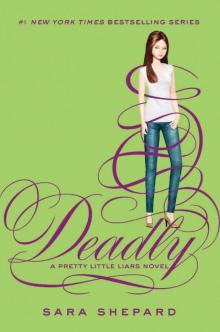 Pretty Little Liars 14: Deadly
Pretty Little Liars 14: Deadly